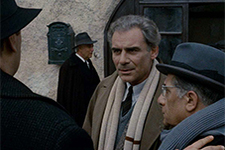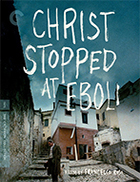Christ Stopped at Eboli (Cristo si è fermato a Eboli)
|  Based on the 1945 memoir of the same title by painter, political activist, and physician Carlo Levi, Francesco Rosi’s Christ Stopped at Eboli (Cristo si è fermato a Eboli) chronicles the year that Levi spent in political exile in Gagliano, a small, ancient, crumbling town in the Southern Italian region of Basilicata, one of the poorest in the country. A trained medical doctor who was born in Turin to a wealthy Jewish physician, Levi was exiled for his anti-Fascist political activity in 1935, but the punishment turned out to be a blessing of sorts as he grew to appreciate and admire the peasants with whom he (along with a half-dozen other political dissidents) was forced to live. Their ways, many of which descended from medieval superstitions, were certainly not his ways, but unlike Mussolini’s Fascism, their culture was genuine and honest, something that Levi could appreciate. The early portions of the film follow Levi as he makes the long trip to Gagliano, which is past Eboli, the last train stop. As the film’s narrator intones, Gagliano lies “where the road and the train abandon the coast and the sea and venture into the wastelands of Lucania.” And, when we first see the area, it does have the feel of a forgotten wasteland—arid and ancient, it feels left behind, forgotten. The title of Levi’s memoir and the film reflects his observation that, had Christ come to Italy, he wouldn’t have made it past Eboli to Gagliano. The rough, cold, mountainous region where the town sits was largely unchanged since the time of Christ, with little technological advancement and a persistent clinging to the old ways (there is only one car in the whole town, the residents prefer chamber pots to indoor plumbing, and once a year a “pig castrator” arrives to cut the ovaries out of the residents’ female pigs, a particularly gruesome rite whose long tradition clearly outweighs any benefits it might offer). Cinematographer Pasqualino De Santis, whose first film was Rosi’s The Moment of Truth (1965) and who later won an Oscar for Franco Zefferelli’s Romeo and Juliet (1968), finds a delicate balance between the grit of abject poverty and the inherent beauty of the harsh landscape in which it is situated. Over the course of his time there, Levi gets to know many of the residents, including Barone Nicola Rotunno (Alain Cunny), the local parishioner who, like Levi, was once a painter, and Giulia Venere (Irene Papas), the only local woman who is willing to work in his house because gendered custom forbids a woman from being alone with a man who is not her husband (she has had 17 children by 15 men and is reputed to be a witch). He also develops a tentative rapport with the town’s mayor, Don Luigi Magalone (Paolo Bonacelli), a Mussolini-supporting Fascist who nevertheless appreciates Levi’s intellect and tries to work with him even as he censors his letters and gently chides him for his anti-Fascist attitudes. Don Luigi is a perfect example of the banality of evil; less a raving lunatic than a mid-managing bureaucrat, he nevertheless enables the evils of Fascism, which hang like low-lying clouds throughout the film. We are acutely aware of Fascism’s presence when Levi’s sister, Luisa (Lea Massari), comes to visit him. While it is a great joy for him to see her, she is also a reminder of the life he has been forced to leave behind. As in his previous films, including Salvatore Giulano (1962) and Hands Over the City (1963), Rosi is fascinated by the inner workings of power. Where Hands Over the City focused primarily on the squabbling politicians and real estate developers who were transforming Naples for their own profit with little concern of how it would affect ordinary people, Christ Stopped at Eboli focuses on exactly the kinds of people who end up getting crushed by thoughtless bureaucrats and businessmanand politicians who can’t see beyond their own noses (there are several scenes that reflect the townspeople’s inability to comprehend the political decisions that affect their lives, such as the taxing of their goats). In writing the screenplay, Rosi, Tonino Guerra (who had a hand in writing nine of Michelangelo Antonioni’s films), and Raffaele La Capria (who co-wrote Hands Over the City) do an admirable job of adapting Levi’s memoir, which is structured primarily as a series of observations of the people and culture of Gagliano, with little in the way of connective narrative tissue or anything resembling a narrative arc. Because the film was partially funded by Italy’s state television company, Rosi had to compose it as four “episodes,” each running about an hour in length with their own opening and closing credits (it has been cut down to various lengths over the years, but the full impact can only be felt in the complete version, which runs close to four hours). The inherently episodic nature of the film benefits the largely observational content, as we watch and get to know the townspeople alongside Levi, who acts as a kind of audience surrogate. Gian Maria Volvonté’s performance as Levi is quite crucial this regard, as he must convey a strong sense of character with the slightest of movements and facial expressions. The manner in which he opens up to the experience of living in this desolate place with people that time seems to have forgotten provides the film with a powerful sense of shared humanity. As Rosi wrote in his director’s statement, it was “in this far-off land” that Levi “discovers a way of life, a human feeling with which he establishes a relationship through which he will be himself transformed.” It is thus crucial that the film opens with Levi, ten years after his time in Gagliano, surrounded by paintings he has made of the people he met and got to know there. Like those paintings, Christ Stopped at Eboli is testament to how, no matter how seemingly extensive the differences among us, we can always find some kind of connection.
Copyright © 2020 James Kendrick Thoughts? E-mail James Kendrick All images copyright © The Criterion Collection | |||||||||||||||||||||||||||||||
Overall Rating: 


 (3.5)
(3.5)


